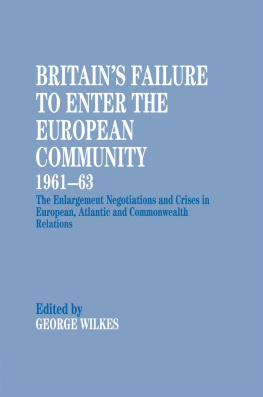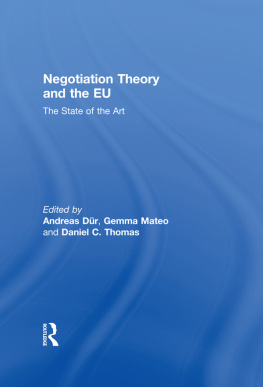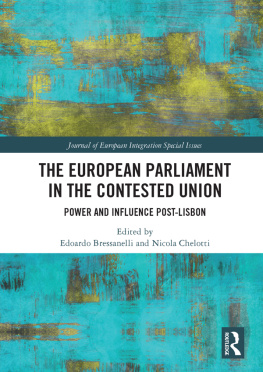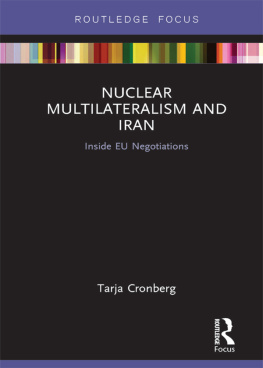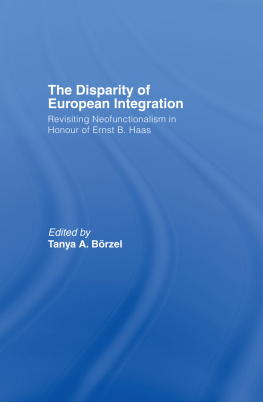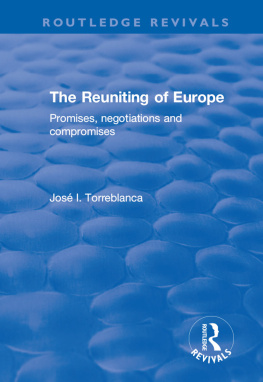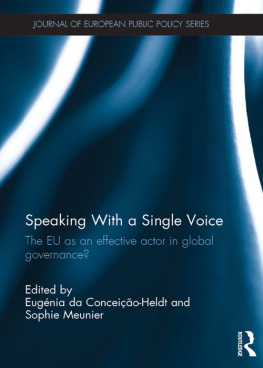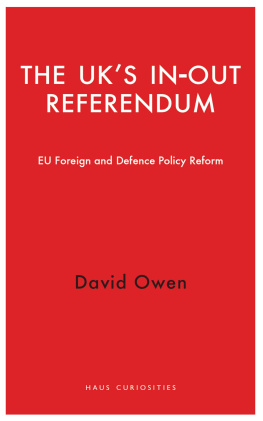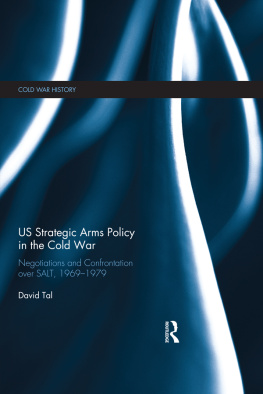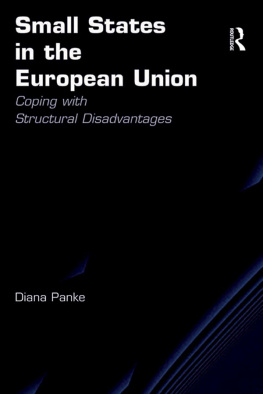STUDIES IN INTERNATIONAL RELATIONS
edited by
Charles G.MacDonald
Florida International University
A ROUTLEDGE SERIES
STUDIES IN INTERNATIONAL RELATIONS
CHARLES G.MACDONALD, General Editor
- PROMOTING WOMENS RIGHTS
- The Politics of Gender in the
- European Union
- Chrystalla A.Ellina
- TURKISH FOREIGN POLICY
AND TURKISH IDENTITY - A Constructivist Approach
- Ycel Bozdaliolu
- ORGANIZING THE WORLD
- The United States and Regional
- Cooperation in Asia and Europe
- Galia Press-Barnathan
- HUMAN RIGHTS IN CUBA,
EL SALVADOR AND NICARAGUA - A Sociological Perspective on
- Human Rights Abuse Mayra Gmez
- NEGOTIATING THE ARCTIC
- The Construction of an International
- Region
- E.C.H.Keskitalo
THE COMMON FISHERIES POLICY IN THE EUROPEAN UNION
A Study in Integrative and Distributive Bargaining
Eugnia da Conceio-Heldt
ROUTLEDGE
New York & London
Published in 2004 by
Routledge
29 West 35th Street
New York, NY 10001
Published in Great Britain by
Routledge
11 New Fetter Lane
London EC4P 4EE
Copyright 2004 by Taylor & Francis Books, Inc.
Routledge is an imprint of the Taylor & Francis Group.
This edition published in the Taylor & Francis e-Library, 2005.
To purchase your own copy of this or any of Taylor & Francis or Routledges collection of thousands of eBooks please go to www.eBookstore.tandf.co.uk.
All rights reserved. No part of this book may be reprinted or reproduced or utilized in any form or by any electronic, mechanical, or other means, now known or hereafter invented, including photocopying and recording, or in any information storage or retrieval system, without written permission from the publishers.
Library of Congress Cataloging-in-Publication Data
da Conceio-Heldt, Eugnia
The common fisheries policy in the European Union: a study in integrative and distributive bargaining/Eugnia da Conceio-Heldt.
p. cm.(Studies in international relations)
Includes bibliographical references (p.) and index.
ISBN 0-415-94902-5 (hardback: alk. paper)
1. Fishery policyEuropean Union countries. 2. NegotiationEuropean Union countries.
I. Title. II. Series: Studies in international relations (Routledge (Firm))
SH254.E87C657 2003
338.3'727'094dc22
ISBN 0-203-49434-2 Master e-book ISBN
ISBN 0-203-57834-1 (Adobe eReader Format)
List of Figures and Tables
LIST OF FIGURES
The four pillars of the Common Fisheries Policy
A conceptual framework for analyzing negotiations in the European Union
Configuration of member states preferences in the integrative bargaining game
Configuration of member states preferences in the distributive bargaining game
The sequence of moves in a bargaining game with a veto player
The extensive-form game between the European Community and Ireland
The extensive-form game between the European Community and Great Britain
The extensive-form game between the European Community and Denmark
LIST OF TABLES
Key dates in the development of the Common Fisheries Policy: 1970 2002
Member states transitive preferences on the structural policy and on the common market organization
Ranking of alternatives by coalitions on the structural policy
Member states transitive preferences on the application of the equal access principle
Distributive bargaining game with veto players
Comparison of two bargaining games under unanimity voting
Acknowledgments
In the process of writing my dissertation, on which this book is based, many people have helped, directly or indirectly. Trying to acknowledge the contributions of the people who supported and helped me in many ways during the last three years is a humbling task. At the same time, it gives me the pleasure of thanking those who guided my academic preparation and those who shared these times with me as friends and colleagues. First of all, this study would not have been possible without the diligent supervision and the intellectual stimulus of Prof. Dr. Michael Bolle, who transmitted to me his passion for rational-choice and public choice theory. I am also indebted to Prof. Dr. Otto Keck and to Prof. Dr. Thomas Knig for their numerous insights into the subject and constructive criticism. Many colleagues and friends have provided valuable encouragement and help to me during the course of writing this dissertation by reading and commenting on parts of the manuscript. I should like to express my gratitude in alphabetical order to: Uli Brckner, Christian Fahrholz, Hans-Walter Heldt, Achim Kemmerling, Charles MacDonald, Mark Pollack, Uli Sedelmaier, Sabine Schwarz, and Bernhard Zangl. I also wish to thank very much Fiona Heldt, who faithfully corrected endless versions of this manuscript. For the graphical assistance I thank Stephan Hohenberger. Despite the extensive intellectual contributions from many people, I alone take responsibility for what I have written.
I also wish to acknowledge publicly my large debt to two institutions which directly contributed with resources to this research project. My gratitude goes to the Studienstiftung des deutschen Volkes for providing me with financial support during the last two and half years. I am also grateful to the Jean Monnet Centre of Excellence of the Department of Political Science at the Freie Universitt Berlin, and especially to Prof. Dr. Michael Bolle, for providing the academic space to research this topic.
Finally, this book is dedicated to Oliver Heldt for his support and for helping me see over the last years that there is more to life than what you are about to read.
Berlin, September 2003
Abbreviations
BATNA Best Alternative to a Negotiated Agreement
CAP Common Agricultural Policy of the European Community
CFP Common Fisheries Policy of the European Community
COPA Comit des Organisations Professionelles Agricoles
COREPER Comit des Reprsentants Permanents, Committee of Permanent Representatives of Member States to the EU
EAC European Affairs Committee of the Danish national parliament
EC European Community
EEC European Economic Community
EEZ Exclusive Economic Zone EP European Parliament
EU European Union
Euratom European Atomic Energy Community
FAO Food and Agricultural Organization of the United Nations
GATT General Agreement of Tariffs and Trade
Ifremer Institut franais de recherche pour lexploitation de la mer
MS Member State
OECD Organization for Economic Cooperation and Development
QMV Qualified Majority Voting
SQ Status quo
TACs Total Allowable Catches
UNCLOS United Nations Convention of the Law of the Sea
Introduction
Analyzing negotiations in the European Union
FINDING A STARTING-POINT: THE EU AS A NEGOTIATING POLITY
The recent bifurcation of European studies into state-centric and new institutionalist camps has resulted in a sterile theoretical debate that says little about an empirical world where bargaining outcomes cover both member states preferences and institutions. This work is an attempt to move beyond the theoretical debate. It elaborates on the gap between theoretical and empirical studies. For this a conceptual framework for analyzing negotiations in the European Union (EU), considered to be an actor in its own right, and also by the institutional setting, which includes the variables limiting the range of feasible alternative actions available to an actor. In this thesis, institutional setting refers to the formal (voting or decision rules) and informal rules (iterated or repeated bargaining) of a bargaining game, which defines a particular negotiating situation in which


